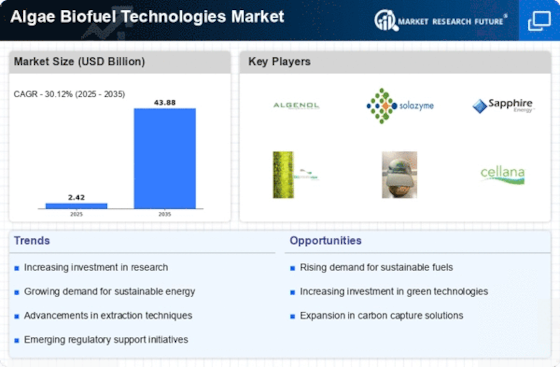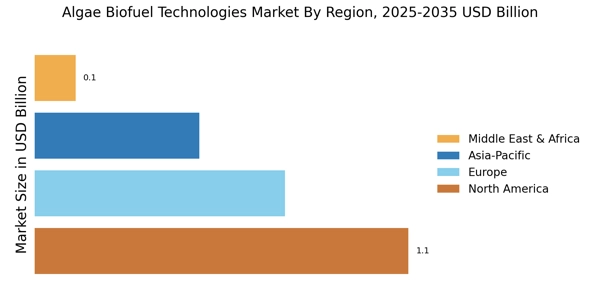Supportive Regulatory Frameworks
The Algae Biofuel Technologies Market benefits from supportive regulatory frameworks that promote the adoption of renewable energy sources. Governments worldwide are implementing policies and incentives aimed at reducing greenhouse gas emissions and fostering the development of biofuels. For example, mandates for renewable fuel standards and tax credits for biofuel production are encouraging investments in algae biofuel technologies. These regulatory measures not only create a favorable environment for market growth but also stimulate research and development efforts within the industry. As a result, the Algae Biofuel Technologies Market is likely to expand, driven by the increasing alignment of governmental policies with sustainability goals.
Rising Demand for Renewable Energy
The Algae Biofuel Technologies Market is experiencing a notable surge in demand for renewable energy sources. This trend is largely driven by increasing awareness of climate change and the need for sustainable alternatives to fossil fuels. As governments and organizations commit to reducing carbon emissions, algae biofuels present a viable solution. The market for biofuels derived from algae is projected to reach USD 30 billion by 2027, indicating a robust growth trajectory. This rising demand is further fueled by advancements in algae cultivation and processing technologies, which enhance the efficiency and cost-effectiveness of biofuel production. Consequently, the Algae Biofuel Technologies Market is positioned to play a pivotal role in the transition towards a more sustainable energy landscape.
Increasing Awareness of Environmental Impact
There is a growing awareness of the environmental impact of traditional fossil fuels, which is driving interest in the Algae Biofuel Technologies Market. As consumers and businesses become more environmentally conscious, the demand for cleaner energy alternatives is rising. Algae biofuels offer a sustainable solution, as they can be produced with lower carbon footprints compared to conventional fuels. This shift in consumer behavior is prompting companies to explore algae-based biofuels as part of their sustainability strategies. Furthermore, educational initiatives and public campaigns are enhancing understanding of the benefits of algae biofuels, thereby expanding the market. The Algae Biofuel Technologies Market is likely to thrive as awareness continues to grow, aligning with global sustainability objectives.
Growing Investment in Sustainable Technologies
Investment in sustainable technologies is a key driver for the Algae Biofuel Technologies Market. As the global focus shifts towards sustainability, venture capital and private equity firms are increasingly channeling funds into algae biofuel projects. This influx of capital is facilitating research, development, and commercialization of innovative algae-based solutions. According to recent estimates, investments in algae biofuel technologies could exceed USD 10 billion by 2026, reflecting the growing confidence in the market's potential. This financial support is crucial for scaling production and enhancing the competitiveness of algae biofuels against conventional energy sources. Consequently, the Algae Biofuel Technologies Market is poised for significant growth as it attracts more investment.
Technological Innovations in Cultivation and Processing
Technological innovations are significantly shaping the Algae Biofuel Technologies Market. Recent advancements in cultivation techniques, such as photobioreactors and open pond systems, have improved the yield and quality of algae biomass. Moreover, breakthroughs in extraction and conversion processes are enhancing the efficiency of biofuel production. For instance, the integration of genetic engineering and synthetic biology is enabling the development of high-yield algae strains. These innovations not only reduce production costs but also increase the overall viability of algae biofuels as a competitive alternative to traditional fuels. As a result, the Algae Biofuel Technologies Market is likely to witness accelerated growth, driven by these technological advancements that enhance productivity and sustainability.

















